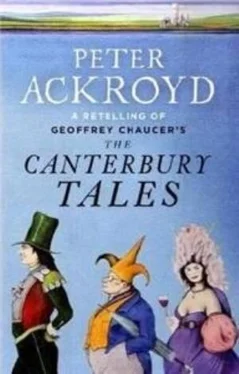Heere bigynneth the Cookes Tale
There was a London apprentice, bound to the victuallers’ trade. I am in the same guild. That’s how I heard about him. He was as merry as a goldfinch in a hedge; he was very good looking with a dark complexion and short dark curls. He was a little short, but that did not matter. He was, to put it in a phrase, well groomed. He could dance so nimbly that he was known as Peter the Performer. He was as full of love and lust as the hive is full of sweet honey. Any girl who met him was sure to have a good time. He would sing and dance at every wedding party, and he preferred the tavern to his shop. If there was any procession going down Cheapside, he would leap from behind the counter and stay in the street until he had seen everything. He would jump up and down and cheer as if his life depended on it. His fellow apprentices used to join him, and become very boisterous. You know how apprentices are. Anything for a laugh. A song and dance are better than work.
They also used to make appointments to meet in a certain secret place and play at dice. Peter was easily the best dice-player in the city and, in these out-of-the-way dives, he spent his money very freely. It was not exactly his money, however, as his employer discovered. The cash box was often mysteriously empty. A master will suffer for the sins of a wayward apprentice. He may have no part in the love games, or the revelry, or the gambling, yet he will pay for them in the end. That is sure. Peter might play well on the guitar and the fiddle but, as far as I am concerned, a debauched apprentice is nothing better than a thief. In a man of low degree, honesty and high living can never come together.
In any event the apprentice stayed with his master until he had finished his seven years’ indenture. His employer scolded him and shouted at him. There were even times when Peter was led off in shame to Newgate prison, with the minstrels parading before him. But nothing seemed to do any good. At the end of the seven years, when Peter asked for his certificate of release, his employer remembered the old saying: ‘It is better to get rid of a rotten apple before it infects the rest of the barrel.’ It is exactly the same with a dissolute servant. Better to dismiss him before he corrupts the others. So the master gave Peter his release, wished him bad luck, and sent him on his way. Peter went off in high spirits, ready to begin a life of freedom and debauchery wherever he could find it. There is no thief without an accomplice, someone who can help him waste and spend any money there is to be found by good or evil means. In fact Peter had already sent his bed and his belongings to a companion in sin. Now this companion had a wife. She pretended to own a shop, but in fact she was a prostitute -
‘Oh,’ exclaimed the Prioress. ‘Please. No more.’
‘That’s enough,’ Harry Bailey said. ‘I don’t mind dirty stories. But I draw the line at whores. Whatever are you thinking of, man? There are nuns among us.’
Roger was a little abashed. ‘I didn’t mean to offend -’
‘Well, you have offended. Sit on your saddle and stay silent. Someone else will have to tell a story.’
Heere endeth the Cookes Tale
The Man of Law’s Prologue
The wordes of the Hoost to the compaignye
Our Host saw that the sun had risen high into the sky, and reckoned that it was already mid-morning. Although he was not deeply learned in matters of astronomy he knew from the shadows of the trees, equal in length to the trees themselves, that mighty Phoebus, the great globe of fire, the nurse of life, the sovereign of the heavens, had reached forty-five degrees in altitude. It was the 18th of April. It was ten o’clock. So he turned his horse about and addressed the pilgrims.
‘Lords and ladies,’ he said, ‘I must tell you that a quarter of the sun’s day has already passed. Look how he has climbed the steep heavenly hill. So for the love of God let’s try to lose no more time. Time does not stay and wait for us. When we sleep, or daydream, it runs on like the motion of a stream, never turning and never slowing, forever running from the mountain to the plain. That is why true philosophers lament the loss of time more than the loss of gold. Seneca put it this way: “Belongings can be restored, but time cannot be retrieved.” It cannot be recovered. It would be easier to turn a pregnant girl into a virgin. So let us not moulder now in idleness.’
Then he turned to the Man of Law, who was riding just behind him. ‘Can I ask you, sir, if you would be so kind as to tell a story to us? You agreed by your free consent to furnish a tale, and to adhere to my judgement and choice. So will you now fulfil your promise? Then you will have done your duty.’

‘My good Host,’ the sergeant replied. ‘I agree, of course. I have no intention of breaking my pledge to you and the others. A promise is an obligation, and I always fulfil my obligations. I am one who lays down the law to others. So to law I will be bound. But in truth I must say this to you all. I really do not know a tale that Geoffrey Chaucer has not already told. I admit that he knows very little about poetry, and is hopeless at rhyming, but he has recounted all the stories in such English as he could muster. He may not be very good, but I don’t think there is one old fable he has not written down. If he hasn’t put it in one book, he has put it in another. He has narrated the adventures of more lovers than are mentioned in Ovid’s Epistles . Do you know that ancient volume?
‘In his youth Chaucer wrote about Ceyx and Alcion. Ceyx was lost at sea, and Alcion threw herself into the waves in grief. Since he has written about so many star-crossed lovers, so many noble women and their paramours, why repeat him now? If anyone should open that hefty volume of his, The Legend of Good Women , he will come across Lucretia, who was raped, and Thisbe, who died for love. He loves sad stories. You can read in that book of poor Dido, who fell upon her sword after the treachery of Aeneas, and of Phyllis, who hanged herself from the branches of a tree. You can follow the laments of Dianire and Hermyon, of Adriana and Isiphilee. It is, as I said, a very long book. You can read about the barren island in the middle of the sea, and how Leander drowned himself for love of Hero. What else is there? I could mention the tears of lovely Helen and the woes of false Cressida. I could relate the cruelty of wicked Queen Medea, who hanged her own children for revenge when Jason abandoned her. It is not all doom and gloom, though. Geoffrey Chaucer does manage to praise the faithfulness of Penelope and Alceste.
‘There is one story that he does not tell. He refuses to mention the wicked love of Canacee for her own brother. Well, incest is no fit matter. That is why he does not write about Tyro Appollonius and King Antioch. That cursed monarch took the virginity of his own daughter. Can you believe it? It is too horrible to talk about, especially that moment when he threw her down on the floor and began to -. Excuse me. Chaucer thought about including these stories, but then decided against them. I know that John Gower narrates them, but Gower is not known for his good taste. Chaucer would never sully his writings with such abominations. How do I know? I just know. I will follow his example, in any case, and say no more about them.
‘How shall I begin my own story? I will not repeat Chaucer. I have said that already. I don’t want to be compared to those braggarts who thought that they could rival the Muses and were turned into magpies for their insolence. I will become no bird. And I don’t really care if I fall far short of him. Better a dull dish than no dish at all. Let him stick to his poetry. I will use plain prose.’ So the Man of Law, with a solemn countenance, began the story that you are about to hear.
Читать дальше













